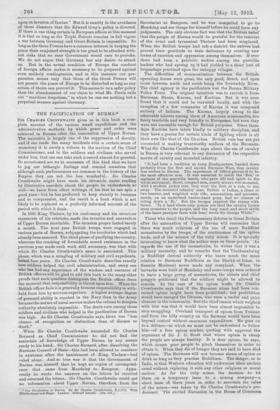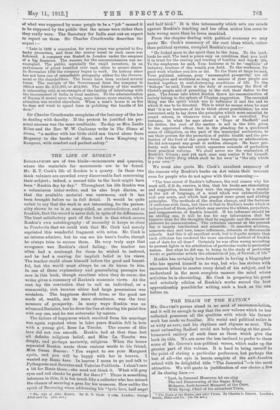THE PACIFICATION OF BURMA.*
Sin CHARLES CROSTHWAITE gives us in this book a com- plete account of the various small expeditions and the administrative methods by which peace and order were achieved in Burma, after the annexation of Upper Burma. The narrative is largely one of the suppression of dacoity, and if one reads the many incidents with a certain sense of monotony it is surely a tribute to the services of the Chief Commissioner, and to the soldiers and civilians who served under him, that one can take such a record almost for granted. So accustomed are we to successes of this kind that we have to jog our lethargic feelings and remind ourselves that although such performances are common in the history of the Empire they are not the less wonderful. Sir Charles Crosthwaite might have made his chronicle easier reading by illustrative anecdote about the people ho understands so well—we know from other writings of his that he can spin a good yarn—but he has preferred to keep strictly to business and to compression, and the result is a book which is not likely to be replaced as a perfectly informed account of the „period with which it deals.
In 1885 King Thebaw, by his contumacy and his atrocious massacres of his relations, made the invasion and annexation of Upper Burma inevitable. The invasion proper lasted barely a month. The next year• British troops were engaged in various parts of Burma, subjugating the territories which had already been annexed. The third phase of pacifying the country, wherever the crushing of formidable armed resistance in the previous year made such work still necessary, was that with which Sir Charles CrosthWaite's name is associated. This phase, which was a mingling of military and civil expedients, lasted four years. Sir Charles Crosthwaite describes exactly how soldiers helped the civil administration, and every one who has had any experience of the wisdom and resource of British officers will be glad to add this book to the many other proofs that such qualities distinguish the British officer from the moment that responsibility is thrust upon him. When the British officer fails it is generally because responsibility is with- held from him by nervous superiors. A higher average degree of personal ability is reached in the Navy than in the Army because the nature of naval service makes the refusal to delegate authority absolutely impossible. The death-rate among those soldiers and civilians who helped in the pacification of Burma was high. As Sir Charles Crosthwaite says, there was "less chance of recognition or distinction than of disease or death."
When Sir Charles Crosthwaite succeeded Sir Charles Bernard as Chief Commissioner be did not find the materials of knowledge of Upper Burma by any means ready to his hand. Sir Charles Bernard, after dissolving the Burmese Council of State—this had been allowed to continue in existence after the banishment of King Thebaw—had ruled alone. And so true was it that the Government of Burma was himself that he kept no copies of correspond- ence that came from Mandalay to Rangoon. Appa- rently he wrote the answers on the letters ho received and returned the letters. Sir Charles Crosthwaite could get no information about Upper Burma, therefore, from the
The Pacification of Burma. By Sir Charles Crosthwaite, Ic.c.s.r. With Illustrations and Maps. London : Edward Arnold. LlOis. net.] Secretariat at Rangoon, and he was compelled to go to, Mandalay and see things for himself before he could form any
judgments. The only obvious fact was that the 'British belief' that the people of Burma would be grateful for the removal.
of the cruel and tyrannical Thebaw had been misplaced..
When the British troops had left a district the natives had. proved their gratitude to their deliverers by creating new forms of exaction and oppression among themselves. If ever there had been a patriotic motive among the guerrilla..
leaders who had sprung up it had yielded to a sheer lust oft brigandage practised upon the unhappy villages.
The difficulties of communication between the British. operating forces were great, the only good, direct, and open route between north and south being the Irrawaddy River.. The chief agency in the pacification was the Burma Military Police Force. The original intention was to recruit it from Burmans, Slms, Karens, and Kachins. But it was soon found that it could not be recruited locally, and with the exception of a few companies of Karens it was composed entirely of Indians. The Karens, largely owing to the admirable labours among them of American missionaries, are fairly tractable and very friendly to Europeans, but even they were not amenable enough for• British purposes. Since those days Kachins have taken kindly to military discipline, and they have a genius for certain kinds of fighting which is all their own like that of the Ghurkas. British rule has not yet. succeeded in making trustworthy soldiers of the Burmans.. What Sir Charles Crosthwaite says about the use of cavalry in Burma is very relevant to any discussion of the respective- merits of cavalry and mounted infantry.
" It had been a tradition at Army Headquarters, handed down, probably from the first and second Burmese Wars, that cavalry was useless in Burma. The experience of 1885-6 proved it to be• the most effective arm. It was essential to catch the Boa,' or captains of the guerrilla bands, who gave life and spirit to the
movement, Short, compact men, nearly always well mounted,. with a modern jockey seat, they were the first, as is rule, to run. away. The mounted infantry man, British or Indian, a stone or two heavier, and weighted with rifle, ammunition, and Accoutre- ments, on an underbred twelve-hand pony, had no chance of riding down a ' Bo.' But the trooper inspired the enemy with terror. 'In a land whore only ponies are bred the cavalry horses. seem monsters to the people, and the long reach and short shrift of the lance paralyse them with fear,' wrote Sir George White."
Those who recall the Parliamentary debates in Great Britain after the annexation of Upper Burma will remember that there was much criticism of the use of some Buddhist monasteries by the troops, of the continuance of the opium trade, and of the seizure of the ruby mines. It is specially interesting to know what the author says on these points. As regards the use of the monasteries, he writes that it was a military necessity, and he remarks that the Thathanabaing (a Buddhist clerical authority who bears much the same relation to Burmese Buddhists as the Sheikh-ul-Islam to Sunnite Moslems) never made any complaint. When the- barracks were built at Mandalay and some troops were ordered! to leave a large group of monasteries, the abbots and chief
pongyis petitioned that the soldiers might be allowed to remain. In the case of the opium traffic Sir Charles Crosthwaite says that if the Burmese alone had been con- cerned opium might have been prohibited ; but prohibition would have enraged the Chinese, who were a useful and quiet. element in the community. But the chief reason which weighed with Lim was that it would have been almost impossible to stop smuggling. Overland transport of opium from Yunnan and from the hilly country on the Salween would have been beyond control without enormous expenditure. He goes on to a defence—in which we must not be understood to follow him—of a free opium market, quoting with approval the argument of Sir J. G. Scott that where opium is cheap the people are always healthy. It is dear opium, he says,. which causes poor people to pinch themselves in order to. obtain it. When they die of hunger they are said to have died. of opium. The Burmans will not become slaves of opium or drink so long as they practise Buddhism. The danger, as in India, is that Western education will undermine their ancient creed without replacing it with any other religious or moral motive. As for the ruby mines the decision to let them on a temporary lease to a mining company—a short lease of three years in order to ascertain the value- of the mines—was taken by Sir Charles Crosthwaite's pre- decessor. The excited discussion in the House of Commons.
of what was supposed by some people to be a "job" caused it
to be supposed by the public that the mines were richer than they really were. The Secretary for India sent out an expert to report on them. Sir Charles Crosthwaite describes the sequel :- TM Late in 1889 a concession for seven years was granted to five lucky promoters, and then the course usual in such cases was followed. A company was floated in London under the auspices of a big financier. The success for the concessionnaires was un- exampled. The public, especially the small investors, in an enthusiasm of greed tumbled over each other to secure shares. In November 1899 the company began to work. Its history since has not been one of remarkable prosperity either for the Govern- ment or the shareholders. The terms have been revised several times. The receipts of the Government from the company in 1003-4 were Rs. 2,11,500, or £14,000. The history of this matter is interesting only as an example of the futility of interfering with the Government of India in local matters. To the administration of Burma it meant more writing, more labour, more anxiety, when attention was needed elsewhere. When a man's house is on fire ho does not want to spend time in polishing the handle of his door."
Sir Charles Crosthwaite complains of the leniency of the law in dealing with dacoity. If the protest be justified his per- sonal success was the more creditable. To-day, as Mrs. Leslie Milne and the Rev. W. W. Cochrane write in The Shane at Home, "a mother with her little child can travel alone from Moganny to the border of Siam, and from Kengtung to Rangoon, with comfort and perfect safety."











































 Previous page
Previous page